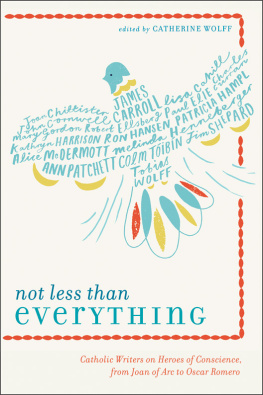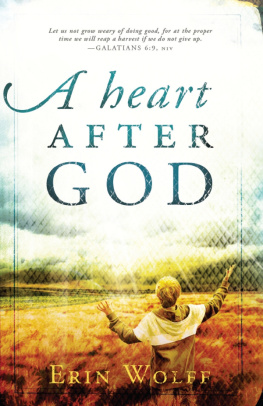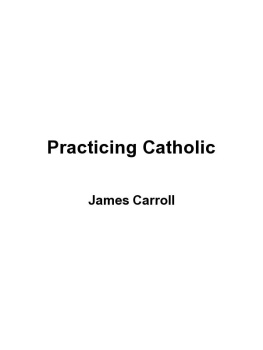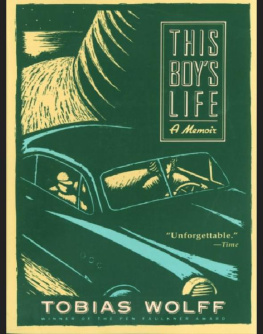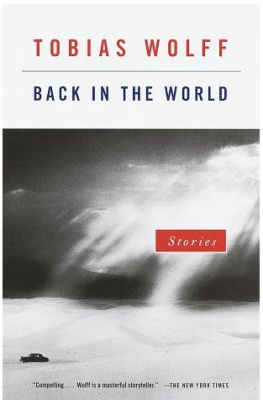
for Toby and Bill
CONTENTS
Catherine Wolff
Tom Beaudoin
IGNATIUS OF LOYOLA
Lisa Sowle Cahill
MARY MAGDALENE
Bo Caldwell
HENRY BARTEL
James Carroll
ISAAC HECKER
Joan Chittister, O.S.B.
HILDEGARD VON BINGEN
Paul J. Contino
MONSIGNOR JOHN V. SHERIDAN
John Cornwell
MAX SCHELER
Charles E. Curran
BERNARD HRING
Paul Elie
MICHELANGELO MERISI DI CARAVAGGIO
Robert Ellsberg
BARTOLOM DE LAS CASAS
Mary Gordon
SIMONE WEIL
Patricia Hampl
MICHEL MONTAIGNE
Ron Hansen
GEORGE TYRRELL
Kathryn Harrison
JOAN OF ARC
Melinda Henneberger
SISTER CORITA KENT
Paula Huston
BEDE GRIFFITHS
Patrick Jordan
DOROTHY DAY
Cathleen Kaveny
MOTHER MARY MACKILLOP
Paul Mariani
JOHN BERRYMAN
Robert McClory
EDWARD SCHILLEBEECKX
Alice McDermott
FATHER HORACE MCKENNA, S.J.
Ann Patchett
CHARLES STROBEL
Jim Shepard
OSCAR ROMERO
Martha E. Stortz
MARTIN LUTHER
Colm Toibin
GERARD MANLEY HOPKINS
Tobias Wolff
FRANZ JGERSTTTER
T HIS BOOK HAS BEEN a long time coming. I grew up in a Catholic family in San Francisco during the 1950s and 60s, when it seemed like everybody was Catholic: Irish or Filipino or Italian or Mexican. Catholicism was the medium in which my five siblings and I thrived.
Our family was well educated, staffed by Jesuits, devout. But we were not unquestioning. We had books by Teilhard de Chardin and John Courtney Murray in the house along with The Imitation of Christ. We were never told we had to believe in something just because. We were brought up to explore ideas freely. There was no contradiction between questioning and faith; indeed questioning was how we made sense of faith, how we made it our own.
It was also the time of Vatican II, the great council called by Pope John XXIII to throw open the windows of the Church, to read the signs of the times, in effect to come to terms with modernity. There was a tangible sense of hope that things were changingthe Church that seemed increasingly rigid and authoritarian even to faithful Catholics was reaching out to us and to the wider world. That optimism sustained us through many changes both in the Church and in society. But we have come to a time when the promise of Vatican II is being subverted by those who would nullify or thwart many of its reforms. Catholics today harbor grave concerns about the state of our Church.
Its a long list. Most discouraging are the twin scandals of clergy sex abuse and malfeasance on the part of bishops covering it up. A lack of transparency and accountability in financial matters has led to a fresh series of scandals, reaching into the Vatican itself. In the United States, bishops are intervening in politics and public policy in ways that violate prudent boundaries while refusing to welcome women into full membership and leadership in the Church or to address the retrograde, even ignorant teachings on human sexuality. Church leaders show no interest in making changes in Church governance that would bring about more participation by the laity and a greater sense of collegiality representative of the magnificent diversity of the global Church. The hierarchy, in some cases inept or corrupt, is increasingly isolated from those it claims to lead.
These problems undermine the ability of the Church to mediate faith for its members, with all that entails: preaching the gospel, fostering a community of faith, establishing moral guidelines in response to the legitimate demands of the society in which we live.
The task of remaining within the Church today is a difficult one for me. Im not speaking of having doubts about the essential tenets of the gospelfor some reason I have never experienced those, and I am truly thankful for that. However, I am continuously appalled by the behavior of many of those who claim authority over me and over the practice of my faith. To what extent is anyone required to submit to those in authority who have seriously compromised themselves and others? To what extent do such figures even hold legitimate authority? I yearn for other spiritual leaders.
Where better to look than the communion of saints? The Catholic cosmos is crowded not only by those present but also by those who have gone before. As Saint Augustine said, it should not seem a small thing to us that we are members of the same body as these. Theologian Elizabeth Johnson, who has explored for contemporary Catholics our communion with the friends of God and prophets, writes that their adventure of faith opens a way for us, that we together form an ongoing river of companions seeking God.
In the early days of Christianity, people felt closely connected to others who had paid a great price, even death, for professing their faith. They experienced sustaining companionship with those beyond the grave. Later, as the Church took on characteristics of the Roman system, saints became patrons and intercessors.
In the paintings of the nativity and other biblical scenes, starting in the early Renaissance, youll see saints in prayerful attendance. They are engaged in sacra conversazionesacred conversation. Sometimes youll see a little donor or two as well, but the saints possess power to put in a good word for us, dramatizing a relationship that transcends time and space, that requires a leap of faith into the unknowable.
Many Catholics think of saints as companions and hold a much broader sense of who a saint is than those who have been formally canonized. Since the twelfth century, canonization has been carried out exclusively under papal authority, resulting in a group that is lopsidedly male, celibate, clerical, or aristocratic. Most of us have our own unofficial list of saints: people whose unusual courage and grace we have witnessed; people whose stories have been reverently handed down, like that of Hildegard von Bingen. (Wonderfully enough, as we were working on this collection, which includes an essay on Hildegard by her sister Benedictine Joan Chittister, Pope Benedict XVI inscribed Hildegard into the catalog of saints.)
Many of these official or unofficial saints have been in situations similar to our own in Church history. They have spoken or acted in ways that challenged the prevailing authorities, knowing they risked reputation, livelihood, sometimes their headsall while remaining faithful. How did they do it? Why did they not just leave the Church or go on to another calling? What disposed them to dissent while remaining faithful to principles, to community? What was the source of their strength? What were the predicaments they found themselves in, what records do we have of their responses? And most important, what can they teach us?
I wondered if I could write a book on such people and sought advice from Father Jim Martin, S.J., author of My Life with the Saints. He thought it was a great idea but said it would take me the rest of my life! So I asked writers I know through my husband, Tobias Wolff, and theologians I know through my late brother, William Spohn, to write essays about individuals whose experience spoke to them, whose witness they valued. They in turn led me to others who might contribute to the collection.
I had no program of my own about which figures to include. I sought the engagement of writers whose intelligence and wisdom I trusted with heroes of conscience whose experience had touched them. In fact, most of the authors already had such models, such companions, and they responded warmly to the chance to write about them.
Next page
